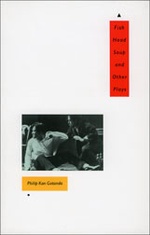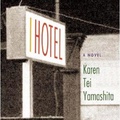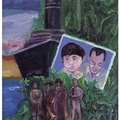>>その2
家族関係から民族問題まで、縦横に広がる作品世界
日系1世から3世まで描くゴタンダの戯曲の世界は、年代でいうと、1910年代から現在までをカバーしている。特に年代が特定できない作品もあるが、時代背景と戯曲との組み合わせは以下のようになる。
1910年代 Ballad of Yachiyo
1920年代 A Song for Nisei Fisherman
1940年代 Manzanar: An American Story, Sisters Matsumoto
1950年代 After the War
1960年代 The Wind Cries Mary
1970年代 Bullet Headed Birds, The Wash
1980年代 Yankee Dawg You Die, Fish Head Soup, Yohen
1990年代 Days Standing on its Head, in the dominion of night
2000年代 floating weeds, a fist of roses, Under the Rainbow
特に時代背景のない作品 The Dream of Kitamura, The Avocado Kid or Zen and the Art of Guacamole
日本で上演された3作品はすべて日系アメリカ人の家族を描いたものだが、他にも上記の表でいくと、父方の伯母で夭折したヤチヨをモデルにした「Ballad of Yachiyo」、60年代を背景にした「The Wind Cries Mary」、 80年代を背景にした「Fish Head Soup」も同系列の戯曲だ。
「Fish Head Soup」で描かれている家族像は暗い。精神が病んだ父、白人男性と関係を持っている母、ベトナム戦争の経験が頭から離れない長男のヴィクター、自殺と見せかけてしばらく家を離れており、日系アメリカ人を描いた映画をつくりたいと思っている次男のマット。それぞれの会話がうまく噛み合わない。この作品の初演は1989年で、ゴタンダは、必ずしも明るい日系家族像を提示していない社会が受け入れる素地ができた、と語っている。ゴタンダが劇作家として79年にデビューしてちょうど10年。社会の変化に敏感に対応しているのがわかる。私には、日系アメリカ人のベトナム戦争の体験が語られているのが新鮮に感じられた。第2幕でヴィクターは弟のマットにこんな台詞を吐いている。
「ベトナムにいたときだって?ベトコンの迫撃砲に打たれたことはお前も知っているだろう。衛生兵はだれも俺のことを構やしなかった。血を流して倒れているのに、他の奴らのところばかりいって。俺は叫び続けた。『俺は日系アメリカ人だ。ベトコンじゃない』。でも誰も来てくれなかった。ただ横を通りすぎていくだけだった」
家族を描いたドラマだが、日系アメリカ人、あるいはアジア系アメリカ人とは何か、というのもテーマとしてひっかかっている。そしてその命題が鮮明に映しだされているのが、「Day Standing on its Head(夜と昼が逆さま)」、「Yankee Dawg You Die(ヤンキー・ドーグ・ユー・ダイ)」と「Under the Rainbow(虹の下で)」の第一幕、「Natalie Wood is Dead(ナタリー・ウッドが死んだ)」である。ここでは、アジア系アメリカ人俳優をモチーフにした後者2つの戯曲を取り上げてみたい。
日系人とアメリカ人のプライドの狭間で
「ヤンキー・ドーグ・ユー・ダイ」は、若い日系男優、ブラッドレー・ヤマシタと年配の日系男優、ヴィンセント・チャンがハリウッドで俳優をやっていくことの意味を語りあう芝居である。チャンは中国名だが実は日系人で、第二次大戦後、中国名にした経緯がある。チャンはアカデミー助演男優賞にノミネートされたことがあり、スカーレット・キモノ(1959年に製作されたサミュエル・フラー監督のサスペンス映画「クリムゾン・キモノ」のことであろう)に出演したことがあると話していることから、マコ・イワマツや、日系3世のジェイムズ・シゲタをモデルにしていると思われる。
アジア系アメリカ演劇で地道な活動をしているヤマシタは、ハリウッド映画で差別的な、お決まりの東洋人を演じてきたチャンを批判する。だが、ヤマシタも結局は、オーディションでそのような役を受け入れ、自分がやることで監督や制作者を説得して変えていくのだ、とチャンにいう。以下、戯曲の最終場面。
ブラッドレー:役を得られれば、変えられると思うんだ。制作者や作家とひざを突き合わせて状況を説明することができる。もしぼくが役をとらなかったらどうなる? 他の奴がとって、とんでもない東洋人を演じることになる。
ヴィンセント:そうだな、ううん。
ブラッドレー:腹を割って話して、説得して変えるんだよ。ぼくはそうする。少しでいい。ほんの少しでもいい。それで成功さ。もし彼らが変えないとしても、少なくとも、ぼくたちがどう考えているか、彼らはわかるだろう。次の機会がある。次の機会になるかもしれないけど。
ヴィンセント:そうだな。ブラッドレー:うん、そういう意味で。些細なやり方だけど、それで勝ちだ。そう、それで勝利なんだ。
このブラッドレーの主張は、おそらく作者の主張でもあるのだろう。このやりとりを読んで、私は2001年に「そして心は踊る」という日系人が書いた戯曲の演出家として来日したマコ・イワマツの言葉を思い出した。公演に合わせて行われた早稲田大学のシンポジウムで、マコは、ハリウッド映画で変な日本人の役が自分に回ってくると、監督に対して抗議をすると発言していた。台詞一行容易に変えられないハリウッド映画の世界で、抗議しても無駄なことはわかっている。でも、自分が憤怒していることは伝えるのだ、と。
タイトルの「ヤンキー・ドーグ・ユー・ダイ」は、Yankee Dog You die(犬畜生のヤンキー、死ね)を、日本人訛りに発音したものである。バーで酒を飲みながら、ヤマシタとチャンが言葉遊びをしているうちにチャンの口をついて出てきた言葉である。
日本人、あるいは東洋人の訛りは、この芝居の冒頭でも使われている。この芝居は、チャンがモト刑事に扮して独白する場面から始まる。モト刑事は、戦前の映画、「ミスター・モト」のシリーズに出てくる主人公で、典型的な東洋人を、ハンガリー系の白人が演じていることで知られている。強い東洋訛りでモトを演じるヴィンセントは、芝居の最後で同じ独白を、今度は訛りなしで演じる。以下。
ヴィンセント:(前略)私はUCLAを卒業しました。生まれも育ちもサンホアンキン・バレーで、カリフォルニアで人生をずっと過ごしてきました。それで、なぜ私の言っていることが聞こえない? なぜ本当の私が見えない?
DogをDawgと発音し、小間使いやウエイターなどの役しか与えられないアジア系アメリカ人の情況を自らの手で変えていくのだ、というブラッドレーの主張と、アメリカ人である自分たちの本当の姿を受け入れて欲しいというヴィンセントの訴えが、二重奏のように響いてくる。
日系女優のキャリアを否定したい
「ナタリー・ウッドが死んだ」は、日系女優の母と娘が、「ヤンキー・ドーグ・ユー・ダイ」と同じように、自分たちが出演してきた映画について語りあっている。作者がノブ・マッカーシーへ、と作品の冒頭に書いているとおり、母親役のキヨコ・ダルホーサーはマッカーシーをモデルにしている。キヨコが、自分が若いときに出演した映画、「Geisha Boy」(邦題「底抜け慰問屋行ったり来たり」1958)や「Five Gates to Hell」(邦題「野獣部隊」1959)に言及していることから、それは明白だ。日本生まれのノブ・マッカーシーこと渥美延は、「Geisha Boy」に抜擢されたことで、アメリカで女優として活躍する足がかりをつかんだ。劇中、キヨコが、「Geisha Boy」について、こんな風に娘に自慢するくだりがある。
「ねえ、ちょっとこれを読んであげるわね。東部の大学で出版されたアジア系アメリカの雑誌に書かれたものなんだけど。えっと……『ゲイシャ・ボーイ……多くの人がこの作品は主演のジェリー・ルイスの馬鹿なコメディだと思っている。でも、私はこの映画を見たとき、この小さな少年に自分自身を見た。そして、もっとも驚いたことは、ジェリー・ルイスが誰を選んだか。彼はマリー・マクドナルドでなく、キヨコ・ダルハーサーを選ぶのだ』。つまり、私ってことね。『「クリムゾン・キモノ」でも、サミュエル・フラー監督は逆のことをしたが、あれと同じである。あの映画では、ヴィクトリア・ショーがグレン・コルベットでなく、ジェイムズ・シゲタを選ぶ。「ゲイシャ・ボーイ」では、ジェリー・ルイスがマリー・マクドナルドでなく、キヨコ・ダルホーサーが演じるミチコ・オカダを選ぶ。マダム・バタフライ症候群が逆転した勝利の瞬間である』」
こんな輝かしい経歴がある母親に対して、娘のナタリー・ハヤシは、自らの女優人生がみすぼらしく、もう女優をやめようと思っている。芸名のナタリー・ハヤシは米国の女優ナタリー・ウッドに因んで、母親が名づけたものだ。ナタリー・ウッドは1981年に映画の撮影中に不慮の事故でなくなり、この芝居のタイトルもその事実がベースとなっているが、ナタリー・ハヤシが「ナタリー・ウッドは死んだのよ」という時、それは自分がハリウッドで女優としてやってきたことを否定したい、という意味が込められている。白人にレイプまがいのことをされる、アジア系の男を無視して白人男性に走る。映画の中でそんなことをしてきた自分に決別したいと思っている。母親のキヨコは、どんなことがあっても映画界に居続けるべきだと説得しようとするが、二人の距離は縮まらない。
エンターテインメントの世界に存在するアジア系アメリカ人の壁。それは、一見成功してきたかに見えるジェイムズ・シゲタもマコ・イワマツもノブ・マッカーシーも、おそらくは感じてきたはずのものである。アジア系アメリカ人が抱えている人種の問題は、ともすると男だけ論じられがちだが、女にもある。「ナタリー・ウッドが死んだ」は、アジア系女性が抱えているだろう人種の問題に踏み込んだ作品といえるだろう。
※本文中に引用した詩・エッセイの翻訳はすべて筆者による。
*本稿は、時事的な問題や日々の話題と新書を関連づけた記事や、毎月のベストセラー、新刊の批評コラムなど新書に関する情報を掲載する連想出版のWebマガジン「風」 のコラムシリーズ『二つの国の視点から』第5回目からの転載です。
© 2009 Association Press and Tatsuya Sudo







